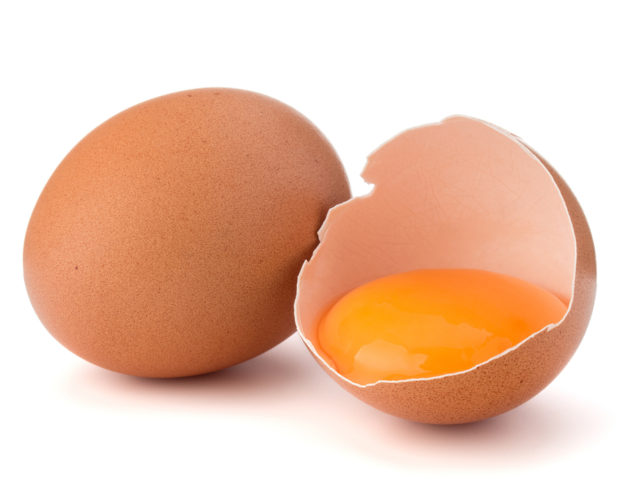By David Blyweiss, M.D., Advanced Natural Wellness
November 25, 2016
- Which eggs are healthiest?
- Clearing up the mystery behind organic, cage-free and free-range eggs
- These are the kind of eggs I buy
Up until a few years ago, most folks considered eggs off-limits. If they ate them at all, they separated out the whites, and threw the most nutritious part – the yolk – into the garbage disposal.
Well, now that eggs are off the hook when it comes to cholesterol and heart disease, you may be eating one or two of them a day – yolk and all.
This is great. The yolk is the part of the egg that’s highest in choline, which is an important brain food. If you don’t have enough of it, it can affect your memory and brain volume.
Egg yellows are also rich in lutein and zeaxanthin. These two nutrients nourish your eyes and are very important when it comes to warding off macular degeneration.
MD Exposes the Hidden Danger to Your Eyes

When your eyesight starts to fail, it's a real problem. Suddenly you can't go to the grocery store... you can't get to the doctor if you have an emergency... you can't meet your friends for dinner…
Your "regular" doctor doesn't have time to keep up with the latest research. And the same goes for eye doctors. They go to school to learn how to fit you for glasses and contacts, but have no way of preventing the damage and loss of eyesight that threatens your freedom and independence.
Let me show you something that explains a LOT about how your eyes work.
In my FREE Special Report, I'll show you a HUGE, untapped resource for your eyes that safely and naturally restores clear, effortless eyesight.
Click here to get started...
Plus, yolks are naturally high in omega-3 fatty acids. While it’s not nearly as much as you’ll get from eating wild-caught fish, it still contributes to your daily intake to protect your heart, brain and help cut down on inflammation.
But I have to admit. These days egg choices are extremely confusing. Should you buy organic or cage-free? What about the ones that are hormone free? Are brown eggs better than white? Is Eggland’s Best really the best?
Which Eggs are REALLY the Best?
I’ll start clearing up the confusion by making four very specific points.
- Advertising that eggs are hormone free is nothing more than a marketing gambit. Hormones are not allowed in producing eggs for human consumption.
- There is no real difference between white or brown shelled They’re both the same on the inside. They just happen to be produced by hens with different colorings. You can even find blue or speckled eggs.
- Eggs that claim they’re from “all-vegetarian fed” hens, like Eggland’s Best, are unnatural. Chickens aren’t vegetarians. They eat worms and insects. If they’re vegetarian fed, their protein is likely coming from GMO sources.
- Omega-3 enriched eggs aren’t all they’re cracked up to be. There’s no guarantee on how much omega-3 they include. It could be only slightly higher than other eggs. Additionally, it’s probably not the same healthy omega-3s (DHA and EPA) found in fish. Rather, the feed has likely been supplemented with flaxseed, which contains an omega-3 fatty acid (ALA) that’s not as beneficial.
Now that we’ve put these common misconceptions to rest, let’s take a look at some of the other puzzling descriptions assigned to eggs.
Organic, Cage-Free or Free-Range?
Picking up a carton of eggs at the grocery store should be an easy task. An egg is an egg… and as long as you weed out the broken ones you should be good to go, right?
The World's Quickest Solution for Ending Prostate and Urinary Misery
This has recently been revealed to be one of the only real breakthroughs in prostate health.
The seeds of a strange fruit (sometimes called "Chinese Apples") hold powerful phytonutrients that are a revolution in prostate health.
In fact, UCLA and Veterans Administration research have now proved this to be true.
Not only that, but it may be the worlds quickest solution for ending prostate misery.
Simply stated, these phytonutrients represent a huge step beyond beta sitosterol, saw palmetto, and other phytosterols alone.
Simply click HERE if you want to have fast prostate relief...restful, uninterrupted sleep...no more constant "urges to go"...enhanced virility...and optimal prostate support for life.
If only it were that simple.
Today, every egg producer wants to make their eggs sound healthier than those sold by their competitors. This creates an air of mystery about which eggs are the best. So let’s take a look at what’s behind all of those perplexing claims.
Cage-free is a useless term. It simply means the chickens don’t spend their lives in a cage. For all you know, there are hundreds or thousands of them packed into a concrete enclosure that allows absolutely no outdoor access. And it has absolutely nothing to do with the feed, care or antibiotic exposure the hens endure.
Free-range eggs aren’t much better. These hens have access to the outdoors, but there is nothing saying what that outdoor environment consists of, or how much time the poultry spend there.
Organic eggs aren’t a horrible choice. But they aren’t the best, either. This term simply means they eat organic feed and don’t receive antibiotics. It’s very similar to the “all-vegetarian fed” category. That’s because instead of eating their natural diet of bugs and worms, they’re probably being fed organic soy and corn products.
Pastured eggs are the kind that I buy. They are, by far, the healthiest eggs you’ll find today.
The hens that produce these eggs actually live outdoors. They bask in the sun and freely dig through the grass and soil to find their preferred food sources… worms and insects. They aren’t fed soy or corn products.
When you break an egg from a pasture-raised hen open, you’ll immediately see the difference.
The yolk is huge and a very deep yellow/orange in color. The egg white is much thicker than you’ll ever see in a commercially raised egg. There won’t be very much of that clear, runny stuff at all.
These are the kind of eggs you can enjoy, knowing that all of the nutrients are intact for your benefit.
SOURCES:
Alexander DD, et al. Meta-analysis of Egg Consumption and Risk of Coronary Heart Disease and Stroke. J Am Coll Nutr. 2016 Oct 6:1-13.
Virtanen JK, et al. Associations of egg and cholesterol intakes with carotid intima-media thickness and risk of incident coronary artery disease according to apolipoprotein E phenotype in men: the Kuopio Ischaemic Heart Disease Risk Factor Study. Am J Clin Nutr. 2016 Mar;103(3):895-901.
Poly C, et al. The relation of dietary choline to cognitive performance and white-matter hyperintensity in the Framingham Offspring Cohort. Am J Clin Nutr. 2011 Dec;94(6):1584-91.
Goodrow EF, et al. Consumption of one egg per day increases serum lutein and zeaxanthin concentrations in older adults without altering serum lipid and lipoprotein cholesterol concentrations. J Nutr. 2006 Oct;136(10):2519-24.








Someone needs to discredit the study on cholesterol in eggs that was done long ago that has made many people deficient in choline.